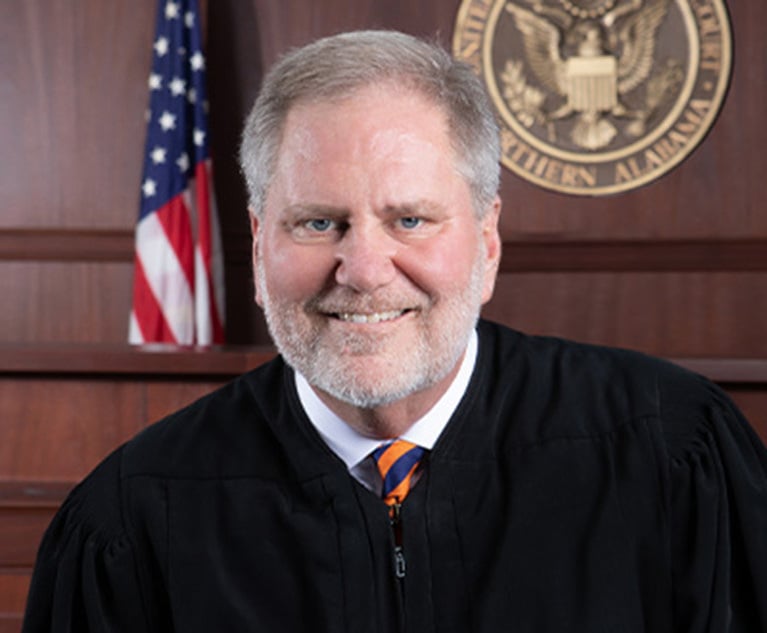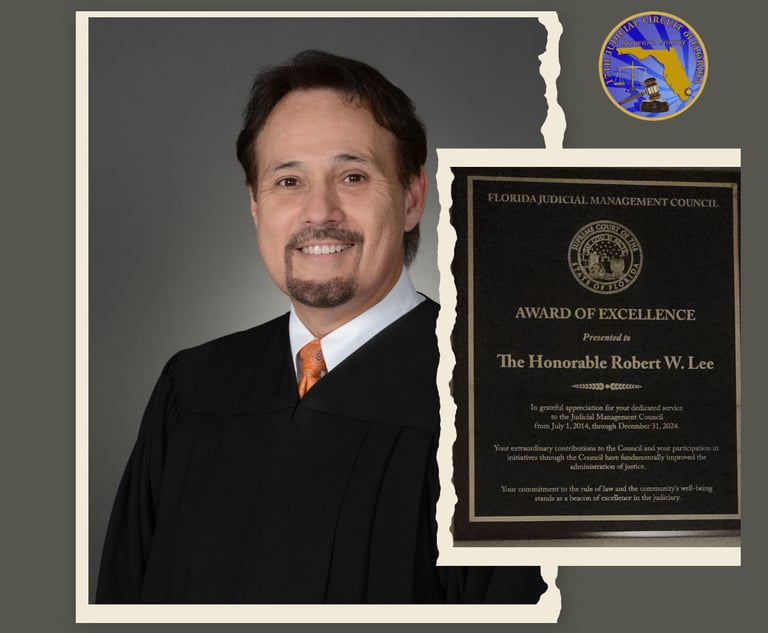Miami Judge Banned From High-Profile Ethics Case That Ended in Disbarment
The Florida Supreme Court directed that further legal proceedings against attorney Jeremy Alters could not be held before Miami-Dade Circuit Judge Marcia B. Caballero, who was the court-appointed referee in the ethics case against Alters.
November 26, 2018 at 03:54 PM
6 minute read
 Jeremy Alters was disbarred by the Florida Supreme Court on Nov. 21. Courtesy photo
Jeremy Alters was disbarred by the Florida Supreme Court on Nov. 21. Courtesy photo
The Florida Supreme Court has prohibited Miami-Dade Circuit Judge Marcia B. Caballero from presiding over further proceedings concerning disbarred attorney Jeremy Alters.
The state Supreme Court added the edict about Caballero in a line in the Nov. 21 order disbarring Alters over misappropriation of about $1 million from his former firm's trust account. Caballero had recommended no sanctions, and criticized the Florida Bar's pursuit of the case against Alters, but Florida justices disagreed.
“We disapprove the referee's recommendations as to discipline and costs,” the high court ruled. “We instead disbar Alters and award the Florida Bar its costs. … We also direct that no further proceedings in this case shall be held before Circuit Judge Marcia B. Caballero as referee.”
 Circuit Judge Marcia B. Caballero.Photo: J. Albert Diaz/ALM
Circuit Judge Marcia B. Caballero.Photo: J. Albert Diaz/ALMCaballero, a Miami-Dade Circuit judge who sits in the Unified Children's Court Division, served as the Florida Supreme Court-appointed referee in the Florida Bar's disciplinary case against Alters. She cited the Florida Supreme Court's discretion in accepting or rejecting a referee's findings.
“After being appointed as referee on this case, I carefully evaluated and weighed all of the evidence and witnesses and thereafter produced my comprehensive report,” she said. “The Supreme Court has now ruled on the matter as they have the ultimate authority.”
The judge's report to the high court not only vindicated Alters of many of the charges against him, but also accused the Florida Bar of being overly draconian in its investigation of the once-prominent lawyer and Democratic Party fundraiser.
The initial November 2016 report by Caballero recommended that the Florida Supreme Court dismiss the ethics case against Alters, a former personal injury attorney who once led Alters Boldt Brown Rash & Culmo.
More than $1 million went missing from the firm's trust fund account in 2009 and 2010. Alters testified that he was initially unaware of the problem, but did not report it to the bar when he did find out. He said he instead replaced the missing funds. Alters then blamed former managing partner Kimberly Boldt, who denied any wrongdoing. He claimed he left “people in charge that I probably should not have in retrospect,” and maintained his innocence.
But the Florida Bar dismissed its ethics case against Boldt and pursued charges against Alters.
Caballero disagreed. Her report recommended the high court find Alters not guilty of fraud, misconduct and misappropriating funds, and called sanctions against him “disproportionate.”
 Referee Recommends No Discipline for Lawyer Jeremy Alters
Referee Recommends No Discipline for Lawyer Jeremy Alters
“It was clear to this referee that the bar stridently pursued the wrong lawyer,” Caballero wrote in 2017. “It was Ms. Boldt who, despite her denials, authorized over $1 million of improper trust account transfers. … There was no evidence that [Alters] authorized or that he knew about the improper trust account transfers when they occurred.”
The referee did, however, recommend the court find Alters guilty of two charges for failing to safeguard and prevent problems concerning the firm's funds. She also held that the Florida Bar should compensate Alters $143,000 to cover his litigation expenses in the ethics case, and described the $305,000 in prosecution costs sought by the bar as excessive.
Florida Bar spokeswoman Karen Kirksey told the Daily Business Review the bar does not comment on disciplinary cases or pending litigation.
'Wholesale Rebuttal of the Referee'
The Florida Supreme Court's order disbarring Alters repeatedly repudiates Caballero's recommendations and findings.
 Jan Jacobowitz, professor of law at the University of Miami School of Law.
Jan Jacobowitz, professor of law at the University of Miami School of Law.“While it is not uncommon for attorneys to be severely punished for trust account violations, the opinion is an extraordinary denunciation of the referee's report,” law professor Jan Jacobowitz told the Daily Business Review.
Jacobowitz, who chairs the Professional Responsibility & Ethics Program at the University of Miami School of Law, said the high court's opinion makes no secret of its dissatisfaction with Caballero's conclusions.
“The opinion notes at each juncture that generally the Florida Supreme Court accepts a referee's recommendations, but then cites both legal support and analysis for overturning the referee's recommendations in this case,” she said.
Jacobowitz added that in her experience, she has not seen similar Florida Supreme Court opinions articulating “a wholesale rebuttal of the referee” in disciplinary cases.
“Even the tone of the opinion, the length and all of the citations … seems a bit unusual,” she said. “They're absolutely putting the nail in the coffin of the referee's recommendation.”
Read the Florida Supreme Court's order:
The UM lecturer added that the tone of the state supreme court's order and Alters' disbarment underscore the seriousness with which the justices regarded violations of the rules surrounding trust accounts and money entrusted to attorneys.
“There is no question that the Florida Supreme Court has historically considered trust account violations to be 'one of the most serious offenses' that presumptively leads to disbarment without significant mitigating factors,” she said. “ I think trust accounts and the handling of money for lawyers often becomes a really slippery slope, where a lawyer doesn't appreciate the severity [of the situation]; once you move money where it's not supposed to be, it's tantamount to theft.”
Alters' legal counsel Andrew Berman, a senior partner with Fort Lauderdale-based Young, Berman, Karpf & Gonzalez, declined to comment.
Related stories:
Ex-Rainmaker Jeremy Alters Disbarred
Referee Recommends No Discipline for Lawyer Jeremy Alters
Florida Bar Should Pay $143K to Alters After 'Imbalanced' Investigation, Referee Finds
This content has been archived. It is available through our partners, LexisNexis® and Bloomberg Law.
To view this content, please continue to their sites.
Not a Lexis Subscriber?
Subscribe Now
Not a Bloomberg Law Subscriber?
Subscribe Now
NOT FOR REPRINT
© 2025 ALM Global, LLC, All Rights Reserved. Request academic re-use from www.copyright.com. All other uses, submit a request to [email protected]. For more information visit Asset & Logo Licensing.
You Might Like
View All
A Judge Ordered Squabbling Lawyers to Have Lunch: Here's What Happened

Sorry. We Can't Get to Your Case: Judge Speaks Out on Judicial Shortages

Trailblazing Broward Judge Retires; Legacy Includes Bush v. Gore

'Serious Disruptions'?: Federal Courts Brace for Government Shutdown Threat
3 minute readTrending Stories
Who Got The Work
J. Brugh Lower of Gibbons has entered an appearance for industrial equipment supplier Devco Corporation in a pending trademark infringement lawsuit. The suit, accusing the defendant of selling knock-off Graco products, was filed Dec. 18 in New Jersey District Court by Rivkin Radler on behalf of Graco Inc. and Graco Minnesota. The case, assigned to U.S. District Judge Zahid N. Quraishi, is 3:24-cv-11294, Graco Inc. et al v. Devco Corporation.
Who Got The Work
Rebecca Maller-Stein and Kent A. Yalowitz of Arnold & Porter Kaye Scholer have entered their appearances for Hanaco Venture Capital and its executives, Lior Prosor and David Frankel, in a pending securities lawsuit. The action, filed on Dec. 24 in New York Southern District Court by Zell, Aron & Co. on behalf of Goldeneye Advisors, accuses the defendants of negligently and fraudulently managing the plaintiff's $1 million investment. The case, assigned to U.S. District Judge Vernon S. Broderick, is 1:24-cv-09918, Goldeneye Advisors, LLC v. Hanaco Venture Capital, Ltd. et al.
Who Got The Work
Attorneys from A&O Shearman has stepped in as defense counsel for Toronto-Dominion Bank and other defendants in a pending securities class action. The suit, filed Dec. 11 in New York Southern District Court by Bleichmar Fonti & Auld, accuses the defendants of concealing the bank's 'pervasive' deficiencies in regards to its compliance with the Bank Secrecy Act and the quality of its anti-money laundering controls. The case, assigned to U.S. District Judge Arun Subramanian, is 1:24-cv-09445, Gonzalez v. The Toronto-Dominion Bank et al.
Who Got The Work
Crown Castle International, a Pennsylvania company providing shared communications infrastructure, has turned to Luke D. Wolf of Gordon Rees Scully Mansukhani to fend off a pending breach-of-contract lawsuit. The court action, filed Nov. 25 in Michigan Eastern District Court by Hooper Hathaway PC on behalf of The Town Residences LLC, accuses Crown Castle of failing to transfer approximately $30,000 in utility payments from T-Mobile in breach of a roof-top lease and assignment agreement. The case, assigned to U.S. District Judge Susan K. Declercq, is 2:24-cv-13131, The Town Residences LLC v. T-Mobile US, Inc. et al.
Who Got The Work
Wilfred P. Coronato and Daniel M. Schwartz of McCarter & English have stepped in as defense counsel to Electrolux Home Products Inc. in a pending product liability lawsuit. The court action, filed Nov. 26 in New York Eastern District Court by Poulos Lopiccolo PC and Nagel Rice LLP on behalf of David Stern, alleges that the defendant's refrigerators’ drawers and shelving repeatedly break and fall apart within months after purchase. The case, assigned to U.S. District Judge Joan M. Azrack, is 2:24-cv-08204, Stern v. Electrolux Home Products, Inc.
Featured Firms
Law Offices of Gary Martin Hays & Associates, P.C.
(470) 294-1674
Law Offices of Mark E. Salomone
(857) 444-6468
Smith & Hassler
(713) 739-1250






